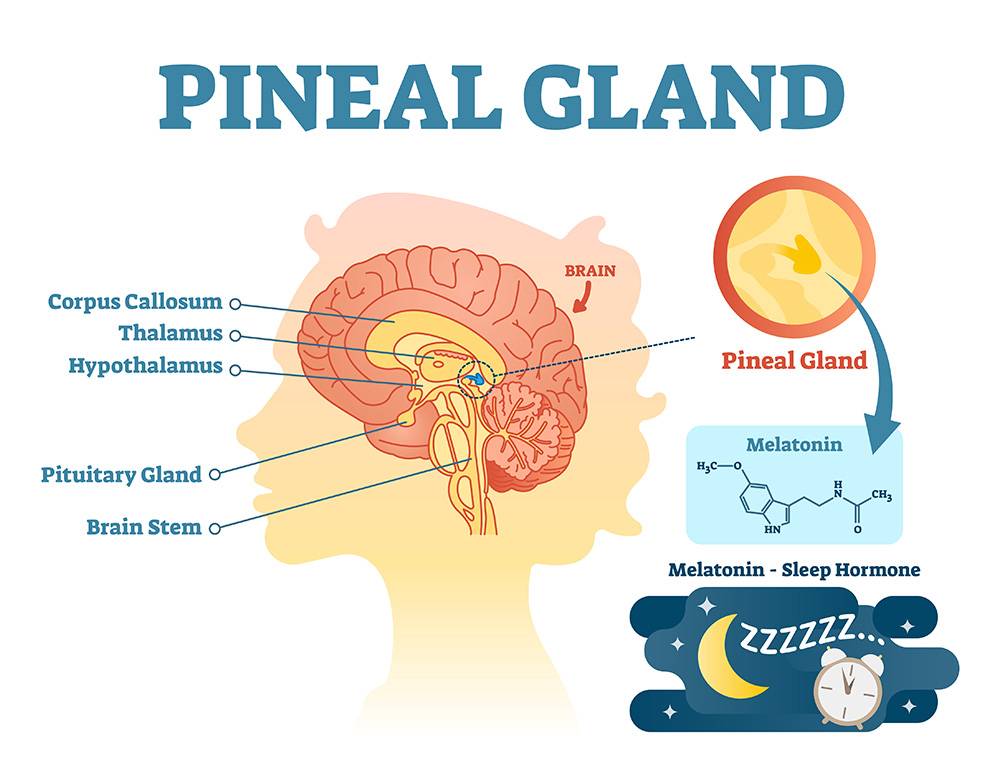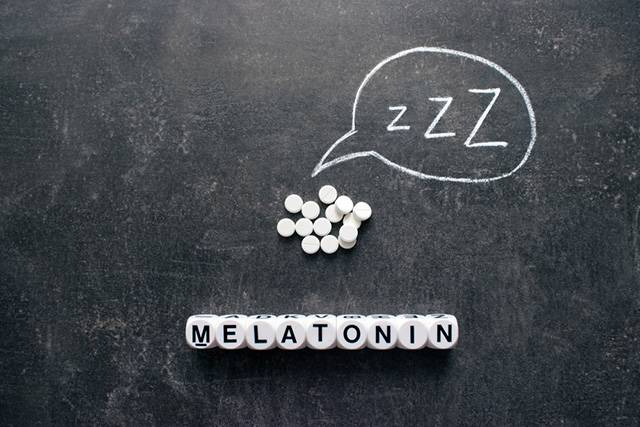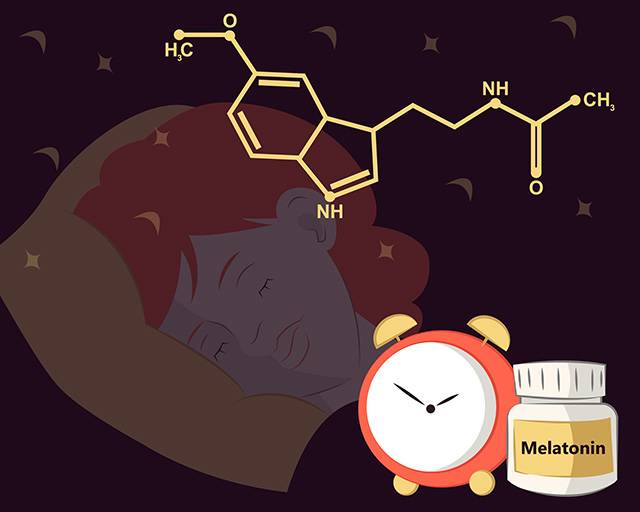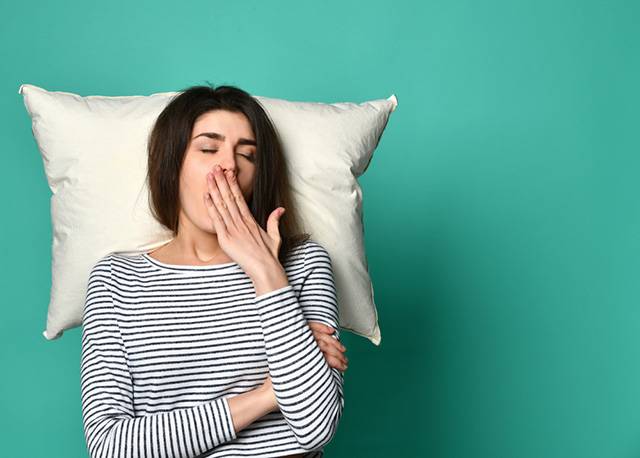Melatonin is a hormone produced by the pineal gland located inside of your brain. This gland is pea-sized, and approximately in the middle of your brain’s structure. Melatonin is the hormone that tells your body when it’s time to be asleep, and when it’s time to wake up. Melatonin production is influenced by light exposure and your body’s internal clock of when to be awake and asleep.
Not everyone is able to produce the right amount of melatonin to sleep regularly. Some people suffer from insomnia or other sleep disorders which keep them up and prevent proper sleep hours. Other people might have to challenge their natural clock if they have night shifts or the need to travel for long periods.
In these situations, the option of a melatonin supplement arises, to manipulate your sleep schedule. A melatonin supplement can come in the form of a chewable, a pill, or a drinkable liquid.
You may want to read: Everything You Need to Know About Melatonin Supplements Dosage and Usage
Why Use Melatonin Supplements?
There are two common reasons behind using sleep supplements. The first reason is because of insomnia or other temporary sleep disorders you need to rectify. Insomnia can either prevent you from falling asleep or not allow you to stay asleep for long. With an increased level of melatonin, your sleep hormones will be stronger and allow you to sleep deeper, and for longer.
The other reason for using melatonin is when you’re working against your typical sleep schedule. This can be a result of jet lag or working in a different time-zone from where you currently are. Manipulating your levels of melatonin will allow you to sleep according to local time, even if your mind is not tired.
People who have to work night shifts also benefit from manipulating their melatonin levels temporarily. Making yourself fall asleep during the afternoon or evening gives you enough energy to work throughout the night until your mind and body are accustomed to this new schedule.
Does Melatonin Actually Work?
While all these reasons are justified, the true question is whether or not artificial melatonin actually works as it should.
The first fact to establish is that artificial melatonin is a medicine or supplement. Everyone’s bodies can react differently to the same medicine. Some people might be highly responsive to the supplement and experience great effects and benefits from it, while others do not and therefore can’t benefit from using it. Supplemental melatonin is never going to work as well or naturally as your naturally produced melatonin, so it may take some time before it actually starts working for you.
There is research and studies which can back up the claim that melatonin works to help you sleep better and initiate the instinct in your mind to sleep. Overtime, and with gradual continuation, you can convince your mind and body when to sleep and when to be awake. You can also help yourself sleep faster to create routine in your life which helps in improving sleep patterns.
There is no statistical evidence which proves that melatonin can help with long-term sleep deficiencies, however. Some research even goes far enough to claim that melatonin does not help at all with a person’s sleep.
Is Melatonin Safe to Use?
Melatonin, being a part of medicine and supplements, should never be taken unless prescribed by a doctor.
Melatonin should not be partnered with the following medicines:
- Birth Control Pills
- Medication for Diabetes
- Immunosuppressants (Medication that suppresses your immune system)
- Blood-thinners (anticoagulants)
If you have been prescribed melatonin but take the following medications, speak with your doctor on the matter before starting melatonin medicine/supplements.
There are also side effects of using melatonin which can affect you negatively.
Side Effects of Using Melatonin
Melatonin usually does not have any side effects, but 1 in 100 people who use it do end up reporting the following symptoms, which relate to the usage of melatonin supplements.
- Daytime fatigue and crankiness
- Headaches and dizziness
- Irritability and restlessness
- Dry mouth and skin and itchiness
- Stomach aches, nausea
- Pains along your legs and arms
- Night sweating, hot flashes, strange dreams
- Anxiety and short-lived depression
More serious symptoms are experienced by 1 in 1000 people, and sometimes may not relate directly to melatonin, but present themselves after consumption. There could be a clash in hormones or medications.
- Signs of depression
- Vertigo, confusion, dizziness, and spinning
- Experiencing psoriasis
- Blurry vision, watery eyes
- Light-headedness
- Bleeding when you urinate
- Heart palpitations
- Allergic reactions (anaphylaxis)
- Trouble breathing and talking
- Tightness within your chest / throat
- Swelling of any or multiple facial features
Once again, these symptoms are extremely rare, but under the unlikely event that you do experience any of these symptoms without them going away, consult a doctor immediately.
Coping with Side Effects
For the more common side effects, there are ways of dealing with them before you head on to the doctors. It’s once these symptoms cannot be coped with and nothing you do helps when you should consider booking your appointment.
- If you’re experiencing daytime fatigue, you should take some light naps and a break from any activities. Avoid drinking alcohol and coffee since these stimulants will only make you more tired in the long run.
- To tone down headaches, make sure you’re drinking enough water in a day. Aim for at least 6-8 glasses of water everyday along with 3 meals a day to keep your energy up.
- If you’re having frequent stomach aches or nausea, then break your meals down into smaller ones and eat more frequently. You can also use a hot water bottle to help soothe your aching stomach.
- Dizziness or light-headedness calls for you to stop everything you’re doing and lie down. Don’t do any exercise, sports, or physical activity that could tire you out.
Melatonin is one way for you to help correct or manipulate your sleeping patterns. Being a naturally produced hormone, your body has a designated way of responding to it, and using artificial melatonin aspires to create the same response. So, if you’re looking for a way to induce more sleep into your busy life, then melatonin could be the right approach. Just be sure to always consult with a doctor prior to starting anything.
Photo credit: VectorMine/Shutterstock; Iryna Imago/Shutterstock;
Tero Vesalainen/Shutterstock; Tero Vesalainen/Shutterstock;
fizkes/Shutterstock; Irenaphoto/Shutterstock;
Nutlegal Photographer/Shutterstock; Fab_1/Shutterstock








